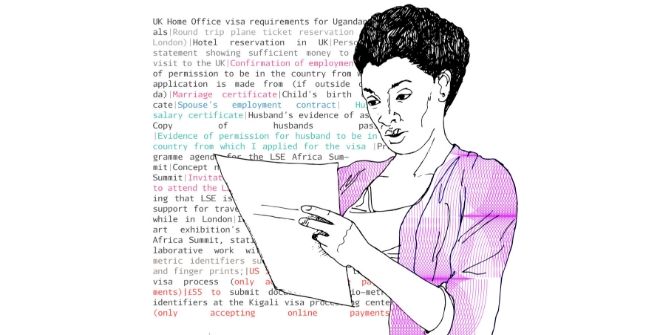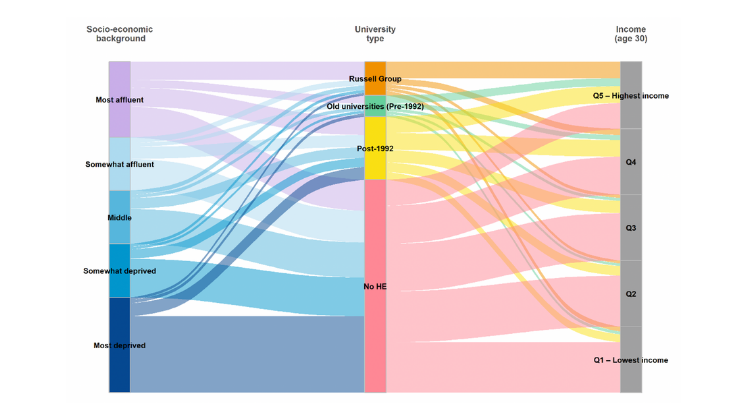As the UK Home Office unveils plans to attract the “brightest and best” individuals to the UK, Johnny Rich outlines how using university league tables as a proxy measure to achieve this goal is unlikely to be successful.
The UK Government has announced a new visa scheme, ostensibly to attract the “brightest and best” graduates from around the world. It’s a laudable aim and any new immigration routes to address skills needs are certainly welcome.
There is a problem, however, with how the Home Office has decided to do its cherry-picking, using a mashed-up league table of league tables and top-slicing the first fifty on the list.
League tables were never designed for the purpose of deciding who deserves a visa and it’s certainly not a purpose for which they are fit. Indeed, this policy shows the same level of understanding about higher education that leaving fridge doors open to combat global warming would show about physics.
Uni league tables do not measure whether someone is a ‘top graduate’ or not. In fact, one of the rankings the government is proposing to use (ARWU) doesn’t even pretend to be a measure of teaching, learning or graduate standards and uses no relevant metrics.
As for the other two (the Times Higher World University Ranking and QS Top Universities), which make broader claims, they mainly focus on research, but also have scores for ‘reputation’ – an entirely circular concept which largely measures how well those unis have done in previous, equally arbitrary, popularity contests.
Uni league tables do not measure whether someone is a ‘top graduate’ or not.
League tables are not even great at assessing research quality, which is a really complex exercise (in the UK alone, we spend hundreds of millions on REF in an attempt to do just that). There are biases based on publishing in English, discipline spread, age of institution, and many other factors besides.
There is a large body of research on the full horror show of everything wrong with university rankings that isn’t worth rehearsing here, because, even if rankings were better, they’re not good for this purpose. I am certainly not saying that these ‘top 50’ are not great universities, but rather, what they are great at is not necessarily being the exclusive providers of the world’s ‘top’ graduates.
A graduate from number 51 on the list will be just as likely to be a ‘top’ graduate as someone from number one. For that matter, so will graduates from hundreds if not thousands of other unis.
And of course, the list will be subject to whims and winds of fate. This year’s number 42 may be out of the list next year, while number 99 makes it in to the top fifty. A student might start a degree at a university which would qualify them for a visa, but by the time they graduate, they’re off the list.
Or, they might leave at a time when their university was apparently deemed ‘not good enough’, but it might later make the list, and then, even though the student got a supposedly inadequate education at the time, all of a sudden they now qualify. This kind of haphazardness is worse than just arbitrary: it’s designed to give preferential treatment not to the brightest and best, but rather to the richest.
The scheme will exacerbate such privilege and, moreover, it is in effect racist. The bias in league tables that prefers older, English-speaking universities, means there are no universities from countries in Africa, South America or large swathes of Asia in the ’top 50’. These ‘top 50 universities’, of which two-fifths are in the US, are mostly very expensive places to study. Add to the fees, the costs of the visa itself (£715), resettlement, extra money to bring family, and so on, and you have effectively ruled out anyone who has potential who doesn’t also happen to have a lot of cash.
This may be the aim: ‘We want the richest graduates who’ve been to elite universities’. If so, they should say so. There is even an economically rational argument for that policy. (Although it’s not one I’d back personally).
Far from a reasonable level playing field, this actively puts UK universities at a competitive disadvantage when it comes to attracting those students believed to be the ‘brightest and best’.
However, be under no illusion: these are not the brightest and best. Some of these universities accept students who, apart from their wealth, are very unexceptional. Yes, some of their programmes are hugely selective, but others are less competitive – filled with students who wanted to go to an elite university and had the money but not the grades.
The fact that being able to access these courses now qualifies you to live and study in the UK will also add to their value, pushing up the fees they can command even further. These elite unis will become even more elitist and exclusive, damaging the courses in the process, as well as destroying fair chances for those who can’t afford them.
Meanwhile, back in the UK, this initiative is damaging to the wider Government interest in supporting our own ‘top’ universities. As Richard Adams of The Guardian has highlighted, international students coming to the UK (even to institutions that would have made the ‘top 50’ list if they were overseas) won’t enjoy the same preferential visa conditions in terms of having employment lined up before completing their studies and how long they can stay.
Far from a reasonable level playing field, this actively puts UK universities at a competitive disadvantage when it comes to attracting those students believed to be the ‘brightest and best’. It’s worth noting that, through its ability to attract international students, the UK higher education sector is conservatively reckoned to be worth over £28.9 billion in export revenue.
I have a long record when it comes to criticising rankings, so perhaps no one will be surprised to see me oppose their elevation to any status of supposed authority, but even Phil Baty, the doyen of the Times Higher’s rankings seems perturbed. In a statement on LinkedIn, he said, “I must say that this isn’t what we had in mind when creating the rankings.” He added that the scheme “will clearly exclude many highly talented individuals studying at great universities around the world that just happen not to fit with the research-heavy (and resource-intensive) focus of the current global rankings.”
The UK wouldn’t be the first to use rankings to support immigration policies, but the other countries that have done so tend not to be places that you’d use as a model for good government. It’s a club we seem increasingly eager to join.
The content generated on this blog is for information purposes only. This Article gives the views and opinions of the authors and does not reflect the views and opinions of the Impact of Social Science blog (the blog), nor of the London School of Economics and Political Science. Please review our comments policy if you have any concerns on posting a comment below.
Image Credit: Convertkit via Unsplash.









Well said